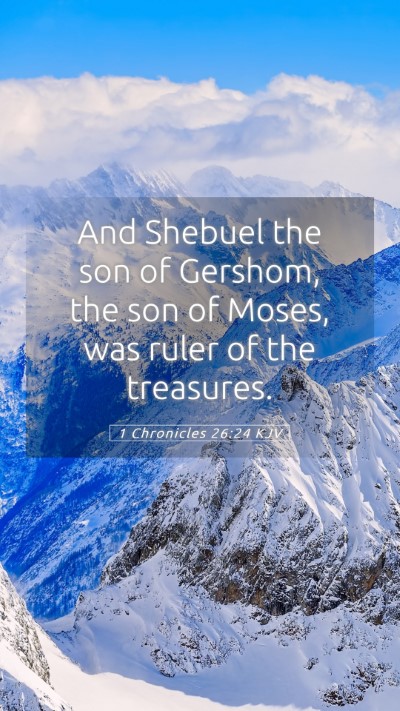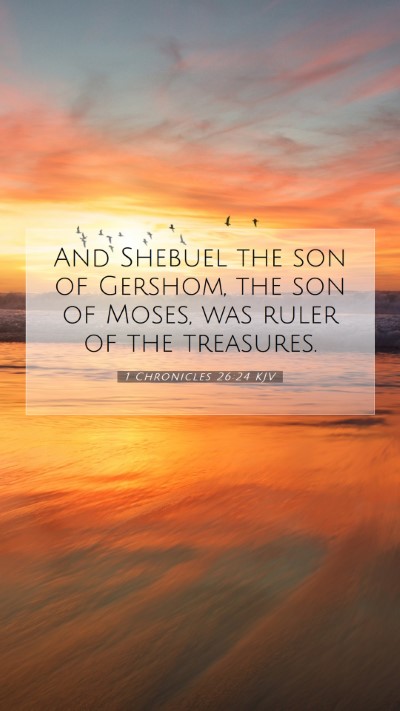Understanding 1 Chronicles 26:24 - A Combined Commentary
The verse 1 Chronicles 26:24 reads:
"And Shebuel the son of Gershom, the son of Moses, was ruler of the treasures."
This verse encapsulates a significant moment pertaining to the organization of the temple's treasures and underscores
the important roles assigned to descendants of key biblical figures. Below is a detailed examination of its meaning,
significance, and applications, drawing from various public domain commentaries.
Verse Context and Historical Background
1 Chronicles serves as a historical account of the Israelites, specifically highlighting their lineage,
duties, and the organization of worship during the reign of King David.
The mention of treasures in this context reflects both physical wealth and the spiritual responsibility
associated with managing resources dedicated to God's service.
-
Matthew Henry's Commentary:
Henry notes that the appointment of Shebuel indicates the importance of lineage and heritage
in service to the Lord. Shebuel, being a descendant of Moses, underscores the continued legacy
of leadership and care over God's tabernacle's possessions.
-
Albert Barnes' Notes:
Barnes emphasizes the administrative aspects of religious duty, asserting that the treasures referenced
were not merely material goods but carried spiritual weight in the context of worship and offerings to God.
-
Adam Clarke's Commentary:
Clarke offers insights into the responsibilities of Shebuel as ruler of the treasures, suggesting that
this role required discernment and integrity, highlighting the trust placed in those who held such positions
within the Israelite community.
The Significance of Shebuel's Role
The role of Shebuel as the ruler of the treasures indicative of the authoritative stewardship
is vital. This appointment illustrates several themes:
- Legacy and Continuity: This reflects the heritage from Moses to the present day, showcasing
how leadership roles evolve yet remain grounded in previous generations.
- Responsibility to God: Managing divine treasures implies a holy duty where one's actions
directly impact worship and community practices.
- Organizational Structure: Establishing roles within the temple solidified community order
and hierarchy in worship practices.
Applications of 1 Chronicles 26:24
Understanding this verse in a modern context prompts us to reflect on leadership and resource management
in our spiritual lives. It encourages believers to consider how they utilize their gifts and resources
in service to God.
- Resource Stewardship: Modern believers are called to manage their resources—be it time,
finances, or talents—dedicating them to God's work.
- Heritage and Responsibility: Just as Shebuel carried a legacy, Christians today
are encouraged to reflect on how their actions impact their spiritual descendants.
- Integrity in Service: Upholding integrity in roles within the church and community
is essential as it affects the wider witness of faith.
Related Bible Cross References
- Exodus 35:21 - Referring to contributions and offerings for the tabernacle.
- 1 Chronicles 28:11-13 - Discussing the planning of the temple's construction.
- 2 Chronicles 31:12 - Highlighting the collection of the tithes and offerings.
Concluding Thoughts
In summary, 1 Chronicles 26:24 offers profound insights into the
religious and administrative framework of ancient Israel.
Scholars like Matthew Henry, Albert Barnes, and Adam Clarke provide deep dives
into the meaning of Bible verses, enriching our understanding through their commentaries.
By contemplating such Scripture, we deepen our biblical exegesis and application in daily life,
aligning our actions with a tradition of stewardship and spiritual diligence.
For those engaged in Bible study, understanding this verse alongside its commentaries
aids in grasping broader biblical themes of heritage, responsibility, and divine service.
This not only enhances personal spirituality but also enriches discussions in Bible study groups,
fostering community growth in faith and understanding.


